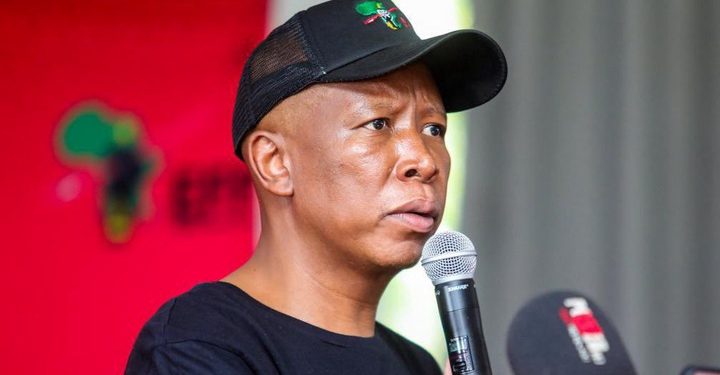In a passionate statement, Economic Freedom Fighters (EFF) President Julius Malema has reaffirmed his party’s commitment to combating corruption in South Africa, specifically targeting two of the most influential figures in the country’s politics: former President Jacob Zuma and current President Cyril Ramaphosa.
Malema, known for his fiery rhetoric, declared that South Africa’s future would not be “sold for the fantasies of an 82-year-old man,” a clear reference to Zuma, whom he labeled “deeply corrupt.” Malema reiterated that the EFF would not only continue fighting corruption during Zuma’s time in office but would also remain resolute in its efforts long after his departure from politics.
Malema’s Challenge to Ramaphosa’s Integrity
Not stopping at Zuma, Malema turned his attention to President Ramaphosa, accusing him of corruption as well. “Zuma is corrupt; we were not deceived about the corruption of Zuma,” Malema stated, signaling that the EFF has maintained a consistent stance on corruption within South Africa’s leadership. He also expressed similar concerns about Ramaphosa’s involvement in corruption, making it clear that the party holds both leaders accountable for their actions.
The EFF leader’s remarks come amid growing controversy surrounding Ramaphosa’s alleged role in the Phala Phala farm scandal. Malema’s call to action, stating “We don’t just talk about corruption, we will be in the streets on Tuesday to fight Phala,” directly references the scandal, which involves accusations that Ramaphosa tried to conceal the theft of foreign currency from his Limpopo farm. This has fueled public debates and calls for an independent investigation into the matter.
The EFF’s Approach: Confrontational or Crucial?
Malema’s combative approach is a hallmark of the EFF’s strategy in holding the country’s leadership accountable. His willingness to take direct action, as exemplified by the planned protests, underscores the party’s belief in not just speaking out against corruption but actively opposing it. The EFF’s stance has sparked debate across the political spectrum: some view it as an essential force for justice, while others see it as a disruptive tactic that might create more political noise than substantive change.
While the EFF’s confrontational tactics are part of its brand, questions remain about the long-term impact of such strategies. Critics argue that while the party’s approach draws attention to important issues, it risks alienating moderates and may not lead to practical solutions. Nonetheless, Malema’s rhetoric and the EFF’s continued activism are likely to play a significant role in shaping the upcoming elections and the broader political landscape in South Africa.
Implications for South Africa’s Anti-Corruption Efforts
The EFF’s relentless push for accountability may influence South Africa’s broader anti-corruption efforts. As the country grapples with the legacies of Zuma’s presidency and the ongoing controversies surrounding Ramaphosa, Malema’s leadership will continue to challenge both public perceptions and political realities. Whether or not the EFF’s tactics can bring about meaningful change remains to be seen, but the party’s actions will undoubtedly keep the issue of corruption front and center in the national discourse.
As the EFF prepares for its protests and ramps up its rhetoric, South Africa stands at a crossroads, with the nation’s political future shaped by its struggle for transparency and justice.






















